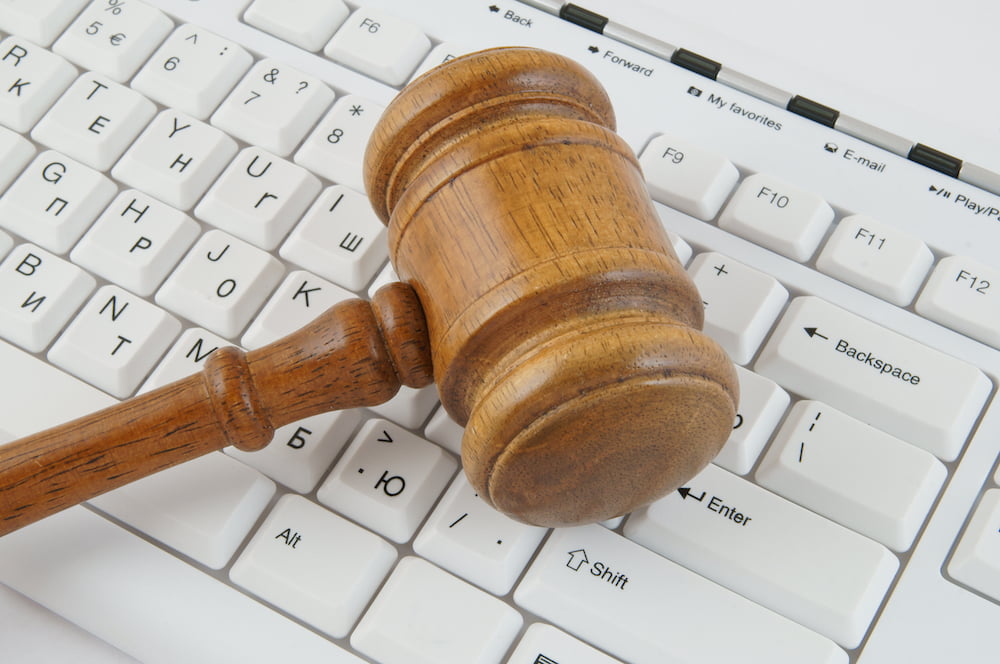
There are plenty of ways to improve productivity in the workplace. You can easily find tools that can automate tasks and eliminate distractions for workers.
One of the ways to boost workforce efficiency is by using an employee computer monitoring program. Because of the exponential growth of the remote work movement, surveillance technologies have also become more prevalent. According to the American Management Association, almost 80% of major companies monitor their employees’ use of the Internet, phone, and email.
Now, if you’re planning to navigate the remote work environment, you must understand employee monitoring laws.
Find out about the rules for watching employees. We’ll talk about privacy laws and when you need permission. Traqq can show you how to keep an eye on your team while following the rules.
In the US, monitoring worker activities during office hours is completely legal. Most state and federal laws have provisions for employers to perform surveillance on anything that happens on company-owned devices.
Moreover, businesses have the right to monitor employee activity within their networks. Employers won’t be in hot water if they decide to track computer activities, internet usage, keystrokes, email messages, and more.
Even so, there are still some limitations to workplace monitoring.
What Is Employee Monitoring in the Workplace?
Employee monitoring has to do with workplace surveillance methods that employers use to ensure accountability and productivity. This practice can be implemented using various ways and tools.
For instance, there are time trackers that record computer activities. In other cases, companies use biometric technology and GPS systems to monitor their employees.
In manufacturing plants or retail warehouses, video surveillance can be used to strengthen the security and productivity of a business. If thieves are caught on camera, shrinkage costs will also go down.
There are different purposes for using time trackers and employee monitoring systems. One of the major workplace problems that they solve is time theft. Monitoring tools analyze employee productivity and ensure that company resources are used efficiently. Moreover, they can be used to gather evidence for possible litigation.
Employee surveillance tech can also come in the form of time and attendance programs. These systems give managers detailed records of paid vacations and billable hours. They are useful not only for compensation calculations but also for resolving attendance disputes. By using automated timesheets, employers can keep accurate records of their employees’ work hours.
If your team’s tasks involve working mostly in front of a computer, you can let them use employee monitoring software. However, if their duties involve driving around, you would need a surveillance app with GPS tracking.
Even so, as a business owner, you must know your limitations when it comes to tracking your team’s activities. Indeed, worker surveillance is mostly legal in the US, but remember to consider employee monitoring ethics as well. Not everything legal can be considered ethical.
Monitoring Employees Is Legal in the US

It is entirely legal in the US to monitor employees. The laws in the country allow employers to perform worker surveillance on company-issued devices. However, the stipulations require valid business reasons to back up the monitoring procedure. In some states, companies are required to establish consent before implementing their surveillance program. Now, when it comes to federal legislation, employers are not legally bound to disclose to their staff that they are being monitored.
Companies Can Legally Monitor Computer Activities
The Electronic Communications Privacy Act of 1986 (ECPA) says that if a company provides a work device, it is considered business property. Now, the law permits employers to monitor systems that they own. So, any activity on a company-issued device is not considered private. An employer reserves the right to monitor document, file, internet, and app usage on a company computer. Even if the employee brings the device home, any activity done on it can be audited.
Employers Can Monitor Social Media and Internet Activities
The U.S. laws give employers the right to ensure that their employees are accessing the Internet during office hours for work-related purposes. Companies are permitted to monitor internet activities, including the websites accessed and the time an employee spends online during work hours. Businesses are even allowed to restrict access to particular sites.
There are specific policies concerning social media sites. For instance, if an employee accesses Facebook on a company-issued device during office hours, their employer is legally permitted to monitor their activities. Moreover, in certain states, it is legal for companies to ask for a candidate’s social media handles for a pre-employment background check.
Employers can also set company policies that restrict staff members from accessing social media platforms during office hours. Meanwhile, in several states, there are laws that prevent employers from requiring employees to submit their social media login credentials.
Companies Can Monitor Keystrokes and Screen Content
Whatever a person types on their company-issued device can be monitored by their employer. In general, a manager can access any information on your work computer. Most of the time, a policy like this is clearly documented in the employment contract.
Employers Can Read Emails

As long as the email went through the company network system, the employer has the right to read it. So, even if you’re accessing your personal email through a company-issued device, your manager still has the right to check the message. Even so, in some states, companies are legally bound to acquire consent from their employees before they can implement email monitoring. This is true for the states of California and Illinois.
Meanwhile, in Delaware and Connecticut, before companies can monitor emails, they must inform their employees first. Moreover, in Tennessee and Colorado, there are laws that require businesses to set policies regarding monitoring employees.
Companies Can Record and Monitor Phone Conversations with Limitations
Even when an employee is using a company-issued phone, there are still limitations to monitoring and recording conversations. The ECPA outlines that it is illegal to intentionally intercept any oral, wire, or electronic communication. However, there are exceptions to this rule:
- The service provider is allowed to access electronic communications.
- Companies can monitor company system usage as long as there’s a legitimate business reason behind it.
- Phone conversations can be recorded as long as there’s consent from at least one party. Every U.S. state has its set of rules for acquiring the consent of parties for recording phone conversations.
Using Video Monitoring Systems in the Workplace Is Legal
As long as there’s a legitimate business purpose for using video monitoring systems, companies can implement them in the workplace. Even so, U.S. federal laws prohibit their use in certain areas in the workplace. For instance, in New York, California, and Virginia, the use of video monitoring systems is not allowed in locker rooms and restrooms.
Essentially, video surveillance is not permitted in spaces where people expect privacy. Moreover, the employer must notify employees and acquire their consent before they can implement video monitoring. In two-party states, federal wiretap laws mention that audio should not be included in video recordings.
Private Messages Going Through Company Networks and Equipment Can Be Monitored
In certain cases, it is legal to monitor an employee’s private messages and emails. As we’ve mentioned, as long as the content went through a company-owned device or network, the employer has the right to check it. Of course, this raises workplace privacy issues, especially when the employee is using their personal device. In this case, there should be a policy in place, which the worker must give consent to.
It Is Legal to Monitor a Worker’s Personal Computer

With a court order and under specific conditions, an employer can gather data from an employee’s personal computer. It is also permitted as long as it is clearly defined in the workplace policy, which the worker gave consent to.
In general, the U.S. Constitution protects employees from unauthorized searches of personal possessions. For example, the Fourth Amendment prohibits companies from unreasonably seizing and searching personal items. Of course, this limits the right of an employer to monitor their workers’ personal devices. However, the Fourth Amendment applies to the government sector only. So, in the private sector, there is limited to no protection against unreasonable seizures and searches of personal devices.
It Is Generally Not Required for Companies to Inform Workers About Monitoring
Informing employees about monitoring is required in two U.S. states, namely Delaware and Connecticut. Meanwhile, in other states, companies are not legally bound to notify their employees about monitoring. Even so, there are privacy laws that provide limitations as to what employers can observe.
It Is Mandatory to Have Clearly Defined Policies on Employee Monitoring
Every business in the U.S. must have clearly defined policies for employee monitoring. Ideally, the code of conduct on workplace surveillance should
- be adequately documented and clearly defined,
- highlight everything that will be monitored and the methods to be used,
- be acknowledged by workers,
- inform employees that there’s little to no privacy on company property,
- assure workers that only performance-related data will be gathered, and
- prohibit anyone in the company from disclosing personal data to third parties.
Employee Privacy Is Still Protected by U.S. Laws
Under the data protection laws of 1998, companies are required to protect the sensitive and personal information of their workers. Moreover, there are plenty of state and federal laws that safeguard the privacy of employees in the workplace. Among these regulations are the California Consumer Privacy Act and the Video Privacy Protection Act.
These laws give employees the right to know about all the details included in the private information that their employers will gather. Even so, they should still understand that there’s limited privacy in the workplace. Most of the time, monitoring policies rule out certain expectations of privacy. This is especially true when it comes to company-owned devices.
If Employee Monitoring Is Legal, Can It Be Considered Ethical?
With more and more people working remotely, the line between office and personal life becomes blurred. Of course, companies expect their staff members to be accountable even when they are working from home. Fortunately, time trackers are available to monitor the productivity of remote workers. However, many people think of time tracking software as a method of spying on employees at home. After all, they are now working in their personal space.
Indeed, employers have the right to monitor their employees during work hours, especially through a company-owned device. After all, managers need to know whether their workers are productive or slacking off. However, when employee monitoring goes too far, it can cause widespread anxiety and distress instead of boosting efficiency.
While a practice like this may be legal, it does not necessarily mean that it is ethical. We must not forget that employees are still humans, and they have the right to privacy. Whether they are working in the office or from their homes, they must be treated with respect.
Luckily, there are plenty of ways to ensure that employee monitoring will not harm people’s morale. For example, under U.S. laws, companies are not required to explicitly disclose video surveillance to their workers. However, visible signage informing them about security cameras is enough to cover ethical grounds. If people know that there are eyes around the premises, they will be discouraged from committing internal theft.
It’s always a good practice to be transparent. Most of the time, employees feel uncomfortable about monitoring. So, it’s crucial to communicate clearly what you hope to accomplish with the system. Moreover, ensure that your monitoring goals align with what the company wants to achieve.
With the Right Tool, Employee Monitoring Can Be Ethical
When choosing employee monitoring software, it’s crucial to find a tool that respects both legal and ethical standards while enhancing productivity. Traqq is one of the few tools that prioritize ethical employee monitoring, tracking billable hours automatically while offering features designed to maintain privacy and transparency.
Traqq provides detailed activity tracking and productivity insights without collecting sensitive or intrusive information. Managers can ensure that work hours are productive without compromising employee privacy, as the data focuses on overall activity rather than personal details.
Transparency is a core principle of Traqq. Employees can access their activity data directly from the dashboard and, if needed, delete any records they feel infringe on their privacy. This empowers workers to maintain control over their data while fostering a sense of trust and collaboration between teams and management. In many ways, employees have control over the data that Traqq gathers.
The best part about this tool is that it is free to use for up to three people. If you download Traqq today, you can access all its features for free! With this app, you’ll have a tool that boosts productivity while protecting your employees’ privacy.

